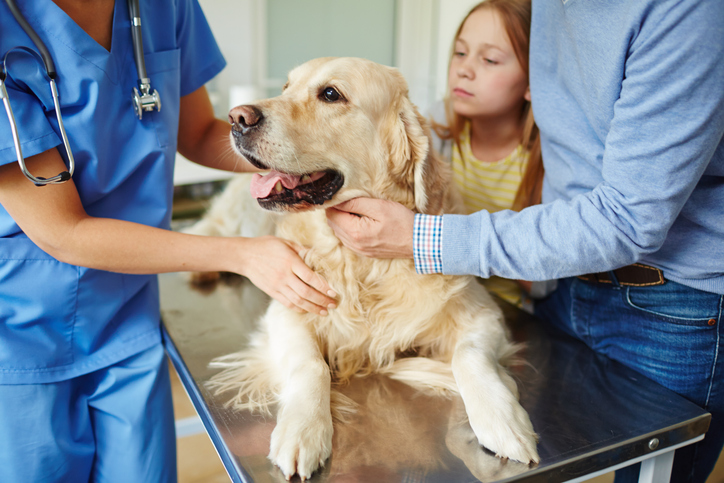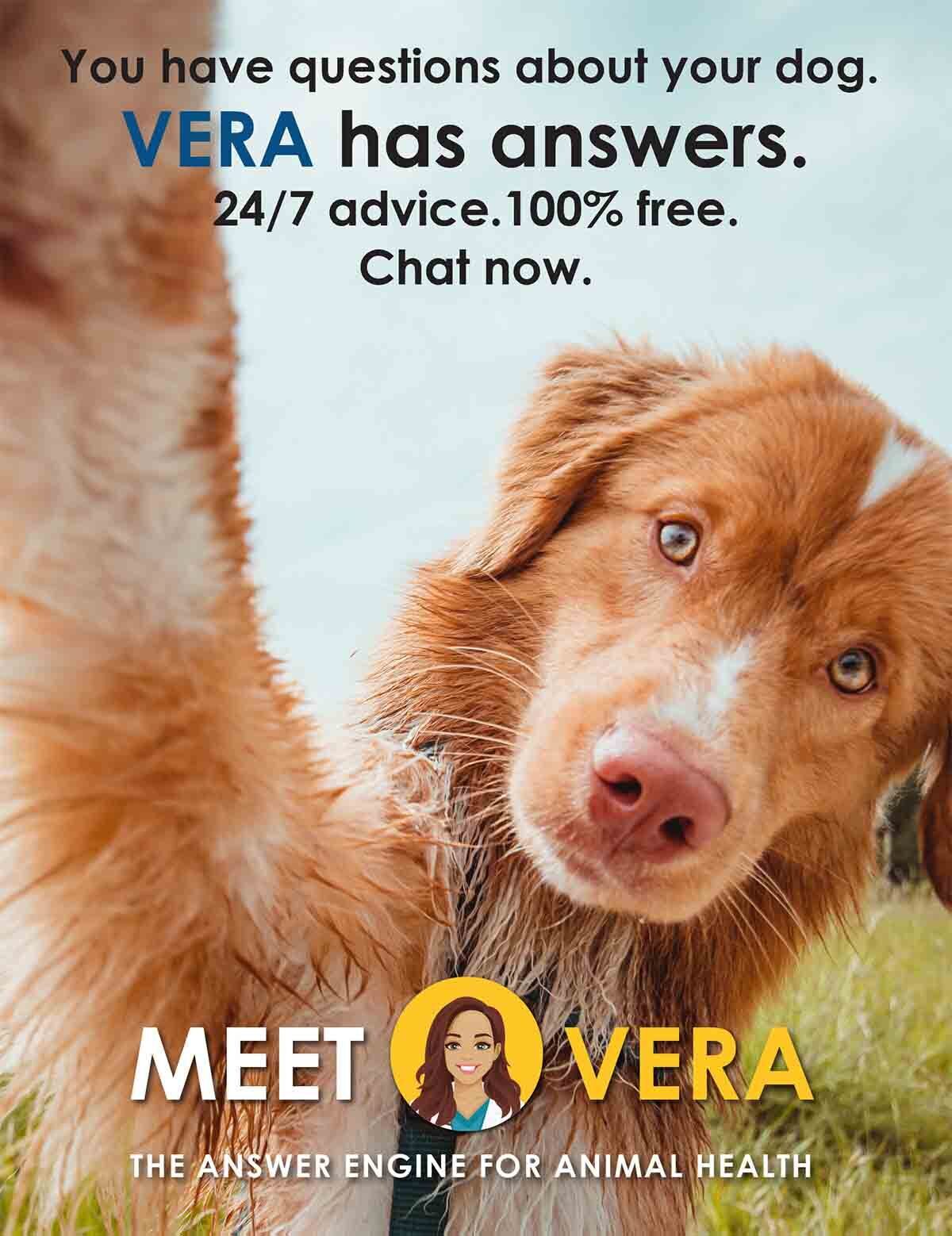The dirty truth about pet ownership is that it is, unfortunately, not always about snuggles, outings, and dog parks! Being the living and breathing animals that they are, sometimes dogs will have a little stomach and intestinal upset – and sometimes they will have A LOT, all over the house! While discussing your dog’s bowel movements may seem a bit embarrassing and gross, have no fear, your veterinarian is ready to receive the down-and-dirty details in order to help get your pup’s intestines back on track!
Diarrhea is one of the most common issues affecting dogs and prompting a visit to their veterinarian. At AskVet, we are constantly fielding questions about feces! Upset tummies are a messy and worrisome issue to have, creating challenges for both dog and pet parent. There are numerous causes of less-than-perfect poops and many things to consider when you find your poor pup struggling with diarrhea.
Why The Diarrhea?
Just like in humans, the digestive tract can get upset occasionally, and for a wide variety of reasons. Scientifically speaking, diarrhea itself is the production of loose and frequent stools due to the rapid movement of ingesta (food, or whatever the dog may have eaten) through the stomach, intestines, and colon. In a nutshell, on a regular day the intestinal contents will take about 8-10 hours to mosey on through the GI tract from one end to the other. Along the way special cells that line the interior of the GI tract absorb nutrients, electrolytes, and water.
If something upsets the intestines or causes them to malfunction, ingesta moves through much more rapidly, resulting in less absorption of water and nutrients and leading to the production of–you guessed it–diarrhea! Quite often, this rapid transit of ingesta through the intestines is also accompanied by some cramping, abdominal pain, decrease in appetite, vomiting, and feeling tired … as well as an urgency to seek their outdoor bathroom again and again!
Believe it or not, veterinarians can gather many useful clues from pet parents’ descriptions of when, where, how often, duration, and the appearance of your dog’s latest defecations. We even like to classify the poop using this convenient Purina Fecal Scoring Chart. Also, a rundown of any new changes in food, treats, exposure or ingestion of toxins or non-food items, medications, and any “dumpster diving” or potential scavenging around the yard lately is extremely helpful to zero in on the root cause of the intestinal issues. There are many things that can rev up and irritate those intestines causing diarrhea in dogs, so veterinarians will consider the details provided by pet parents, compile physical exam findings, and interpret diagnostic test results in order to build a treatment plan and calm those intestines back down.
When To Worry
Diarrhea, quite literally, comes in all shapes, sizes, colors, and consistencies – it can be acute (start quickly) or chronic (recur or persist for a long time). It can be a reaction to something small (stressful event or eating a new treat), or it could be a symptom of something big (Parvovirus). It can range from just a softer poop consistency to a full-on “waterfall” of liquid poop, and it may contain mucous or even blood (red fresh blood or black digested blood). Sometimes with diarrhea, your dog will still feel totally fine, and sometimes they are feeling lousy and acting very sick. Diarrhea can often be accompanied by additional symptoms like vomiting, decreased energy, not wanting to eat or drink, accidents in the house, increased frequency and urgency to poop, posturing and straining with nothing coming out, and licking the rear end area.
An important thing to remember is that not all diarrhea is created equal! Putting all of your pooch’s signs together will help pet parents to decide if the diarrhea may be temporary and self-limiting (go away on its own), or if it needs some veterinary intervention. Dogs that are experiencing a couple of episodes of loose stool, but are otherwise feeling fine, eating, drinking, and acting normally may see their issue resolve on its own after a day or so. Sometimes the original cause of the diarrhea is known (like eating plants outside), and other times it remains a mystery. If this is the case, a virtual consultation with your AskVet veterinarian, monitoring at home, watching their diet closely, and keeping track of bowel movements can be appropriate actions for a pet parent to take.
However, dogs with diarrhea lasting multiple days and exhibiting additional symptoms is always more concerning. Dogs that are not eating, drinking less, vomiting, losing weight, have decreased energy, have abdominal pain, are not acting like themselves, or have red blood or black tarry colors in the diarrhea need to be examined by their vet as soon as possible.
These symptoms indicate that something more serious may be occurring. Supplying as much information to your veterinarian about your dog’s recent diet, timeline of the diarrhea and other symptoms, recent activities, changes in environment, and possible new food or non-food item ingestions and toxin exposures, is very helpful. Your veterinarian will likely move to the next step of gathering more biological information via fecal testing (to rule out parasites, giardia, and viruses), and blood and urine testing (to look for signs of infection, inflammation, organ damage, and dehydration). Further specialized tests, including abdominal x-rays, special blood tests, ultrasounds, food trials, or even intestinal biopsies may be recommended too, in order to narrow down causes and form treatment plans.
Treatments For Diarrhea
Especially for those dogs that were normal the day before and then suddenly started experiencing diarrhea, there are some things you can try at home to see if the event is one of those self-limiting transient gastroenteritis episodes (i.e., something that will get better on its own). However, if your dog is vomiting, has blood in the stool, is not feeling well or stopped eating, or has had diarrhea for multiple days, a visit to the vet is best!
How diarrhea is treated is highly dependent on what the suspected cause may be, how persistent it is, and the current condition of the patient. During a vet visit, your veterinarian may recommend initial treatment with fluids (under the skin or in the vein), probiotics, a special food, antacids, nausea medication, and more.
Short Term Care at Home
If you and your AskVet veterinarian both agree that a specific case of diarrhea may be mild, what can you do at home? And what should your feed your dog who is having diarrhea?
Upset intestines tend to respond well to a low fat “bland diet” as this allows their GI tract to rest a bit while only processing simple proteins and carbs. There are two options for a bland diet: home preparation of plain unseasoned boiled chicken breast and white rice (or a variation of this recipe using lean ground beef, pasta, etc), or a veterinarian-prescribed low fat/low residue gastrointestinal diet. Often, a short stint of these gentle diets will result in the return of the fecal consistency to normal over a period of days, and at that time you can then slowly transfer your pup back to their regular food and see how they do.
Some diarrheas will also respond well to fiber supplements (canned pumpkin, high fiber diets, or psyllium), or a diet change to a different protein source at your veterinarian’s recommendation. Also, the addition of canine-specific probiotics, anti-inflammatory medications, or antibiotics targeting bacterial or fungal infections may be required. Since they are losing fluids through the diarrhea, encouraging water drinking to maintain hydration is recommended during this time, even by adding extra water into the food!
We do not recommend the use of antidiarrheals, Pedialyte, or Pepto Bismol products (human or animal), as those can mask or worsen signs and conditions. Our veterinarians at AskVet are ready to answer all of your questions and weigh in on your pup’s condition and possible ways to support him.
AskVet Tip: Dogs that have been having diarrhea or vomiting may not have a bowel movement for several days, especially if they are on a highly digestible diet. They simply do not have any poop in there! As long as the pup is eating, drinking, peeing, and has good energy, it is normal to not see any poop for several days during the recovery period following diarrhea or vomiting, and it is not an indication of constipation. The poop will come again eventually!
If your pup is otherwise feeling healthy, trying a bland diet at home should yield some positive results in 24-48 hours, but could also take up to a week for the return to normalcy. If you are not seeing any improvement, or your pup is on the decline, an appointment with your vet is needed.
Long Term Care
Dogs diagnosed with chronic intestinal issues like food allergies, chronic enteropathies, chronic colitis, exocrine pancreatic insufficiency, Addison’s Disease, liver disease, cancer, etc, will need therapeutic diets, dietary supplements, and medications for the length of their lives to keep their symptoms under control. Depending on their individual disease process, many of these dogs can live long happy lives once their medications and diets are balanced out, but they do require vigilance from their pet parents and regular check-ups with their veterinarian.
Prevention of Diarrhea
First, let’s go with the obvious – if the diarrhea was likely caused by food, a rapid change in diet, scavenging outdoors, or a new bag of treats, monitoring what your dog eats and avoiding irritants is very important. Feeding a high-quality diet as recommended by your veterinarian and appropriate for your dog’s age and breed, as well as approaching any diet changes gradually over a 1-2 week period will minimize digestive issues as well. And always, preventing your dog from eating random stuff, and limiting/eliminating people food and variation in dog treats will help your dog’s guts stay nice and calm. Keeping your dog’s diet as predictable and regular as possible is what their intestines prefer! Once you find a diet and a few treats they do well with, stick with those!
AskVet Tip: Any time you are changing your pup’s diet, It is important to gradually introduce the new food over a period of 1-2 weeks, instead of changing suddenly in 1 day. This allows them to get used to the new taste and for their intestines to adjust to the new diet. Dogs will often have diarrhea and vomiting with the swift introduction of new foods. On the first 2 days, consider serving 25% new diet and 75% old diet. Every 2 days, add 25% more new diet, taking away the same volume of the old diet. After about 7 days, they will be on the new diet 100% and hopefully, their intestines will be happy and settled!
Also, preventive medicine saves lives! Vaccinating young puppies for Parvo, Distemper and Coronaviruses and avoiding high-risk areas where dogs congregate is recommended until pups have completed the series of vaccines (around 4 months of age). Also, treating intestinal parasites and avoiding infection by giving your pup a monthly dewormer (found in heartworm prevention products) is another way to ensure that parasites are not the culprit!
Getting The Gut Back On Track
Where the vast majority of cases of diarrhea in dogs do resolve with some temporary treatment and the passage of time, the prognosis is highly dependent on the original cause. Hopefully, for the sake of your pup’s comfort level – and the condition of the living room rug – they show improvement within a couple days, and respond quickly to any treatments. For the pups who aren’t faring as well, swift action and veterinary care will give your pup the best chance at stabilization and return to comfort. As always, your AskVet veterinarians are at the ready to field all of your questions about diarrhea in dogs and offer some recommendations for steps to take in their care. Getting your pup back to feeling their best is our top priority!
Written by:
Alexa Waltz, DVM
Dr. Waltz was raised near the beaches of Southern California but has spent her adult life living all over the beautiful United States while serving in the military and as a military spouse. She left California for the first time to pursue a career as a veterinarian at Louisiana State University School of Veterinary Medicine and graduated as a Doctor of Veterinary Medicine in 2006. She was accepted into the US Army Health Professionals Scholarship Program during vet school and upon graduation spent her military years as a veterinarian in San Diego working for the US Marine Corps and US Navy Military Working Dog programs as well as caring for pets of service members. After her military service, she became a civilian veterinarian and continued as a small animal general practitioner at clinics in California, Rhode Island, Colorado, and Maryland. Dr Waltz loves to see her “in person” patients just as much as communicating with and assisting pet parents virtually on AskVet. Dr Waltz is also a Mom to 3 humans, 2 guinea pigs, and 1 Australian Shepherd and in her spare time she loves traveling, adventures, exercising, and doing just about anything out in nature!






